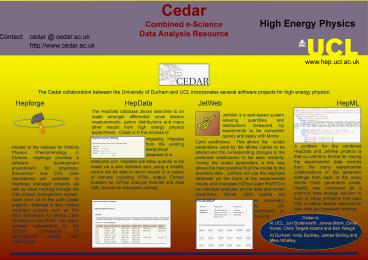High Energy Physics PowerPoint PPT Presentation
1 / 1
Title: High Energy Physics
1
Cedar Combined e-Science Data Analysis Resource
High Energy Physics
Contact
cedar _at_ cedar.ac.uk
http//www.cedar.ac.uk
www.hep.ucl.ac.uk
The Cedar collaboration between the University of
Durham and UCL incorporates several software
projects for high energy physics
HepML
HepData
JetWeb
Hepforge
The HepData database allows searches to be made
amongst differential cross section measurements,
parton distributions and many other results from
high energy physics experiments. Cedar is in the
process of
JetWeb is a web-based system allowing quantities
and distributions measured by experiments to be
compared quickly and easily with Monte
migrating Hepdata from the existing hierarchical
database to a
Carlo predictions. This allows the model
parameters used by the Monte Carlos to be altered
and the corresponding changes to the predicted
distributions to be seen instantly. Tuning the
model parameters in this way allows the best
possible fit of the model to the available data.
JetWeb will use the HepData database as the fount
of the experimental results and leverages HZTool
(later RIVET) to run identical analyses on the
data and model predictions. Monte Carlo events
are generated
A problem for the combined HepData and JetWeb
projects is that no common format for storing the
experimental data records from the many
experimental collaborations or the generator
settings from each of the many Monte Carlo
generators exists. HepML was conceived as a
common data storage solution to both of these
problems that uses XML to define flexible schemas
for both data and generator settings.
Hosted at the Institute for Particle Physics
Phenomenology in Durham, Hepforge provides a
software development environment for physicists.
Subversion and CVS code repositories are
available to Hepforge managed projects, as well
as issue tracking through the Trac project
management system. Apart from all of the core
Cedar projects, Hepforge is also hosting
important projects such as The PEG framework for
Monte Carlo simulations and RIVET, the object
oriented replacement for the HZTool comparator of
experimental results with predicitions.
relational one. Hepdata will allow queries to be
made via a web interface and, using a HepML
record will be able to return results in a
variety of formats including HTML output, Fortran
headers for HZTool analysis routines and Aida XML
records for histogram plotting.
as necessary by job submission to the Grid.
Cedar is
At UCL Jon Butterworth, James Monk, Emily Nurse,
Chris Targett Adams and Ben Waugh
At Durham Andy Buckley, James Stirling and Mike
Whalley.

